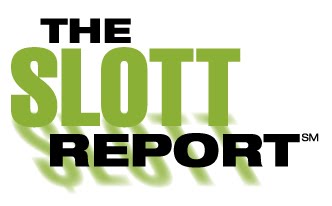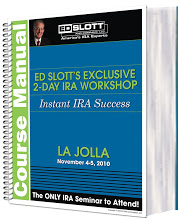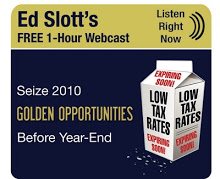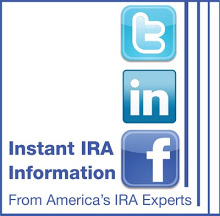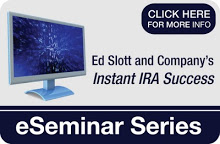Thursday, January 29, 2009
The Slott Report Mailbag: January 29
1.
Ed Slott & Company,
Originally my wife and I worked for the same company for over 30 years and contributed the maximum into the company stock savings plan. Upon retirement we both rolled our SSPP's into traditional IRA's. I am now semi-retired and took my first required minimum distribution last December. I also have a Roth IRA that I started the first year it was available as I do some consulting and have contributed the maximum amount allowed each year since then. We have attempted without success to get a straight answer on how the income limit applies to the Roth conversion. We have fairly large sums in our traditional IRA's that we would like to convert into our Roth IRA's. Three different CPA's are giving mixed answers and IRS Publication 590 is no help in this respect. How is the current $100,000 income limit figured? Does the amount of money converted add into the modified AGI 100K limit? In other words, if my AGI or modified AGI prior to any conversion is 80K, Can we only convert 20K from the traditional IRA's to the Roth's? Also, if a large amount is converted - say 100K - this would push us into a higher tax bracket if my information is correct???
Thanks for any guidance you can give,
Jim
Frankenmuth, MI
Answer: If your joint Modified Adjusted Gross Income (MAGI) is under $100,000 in the year of conversion you can convert any amount from your traditional IRA to a Roth IRA. The amount that you are converting will not count as part of the $100,000. It will, however, be added to your income that year and thus you will pay the resulting income tax. And yes it may put you in a higher income tax bracket that year after adding the converted amount to your other income. If you are age 70 1/2 or older and taking required minimum distributions (RMDs) you do not have to include that amount in the $100,000 MAGI.
2.
Ed Slott & Company,
What was the rationale behind Congress’ decision to suspend RMDs for 2009? I’ve read countless articles that say this suspension will be of great benefit to older, affluent investors, but what about beneficiaries not of retirement age who inherited an IRA and are required to make minimum distributions? How will this law benefit or hurt us this year and into the future?
Doug
Baton Rouge, LA
Answer: Required Minimum Distribution (RMDs) from traditional IRAs are mandatory for individuals age 70 1/2 and older. The amount is determined by the life expectancy factor based on the IRA owners attained age on 12/31 of that year and the prior year (12/31) value of the IRA. Many individuals had to take RMDs in 2008 based on the value of their IRA on 12/31/2007. In several cases the value of the IRA declined significantly in 2008 but they were forced to take the proper amount based on the 12/31 2008 balance to avoid a 50% penalty.
Thus the government felt that not having to take a RMD in 2009 may provide help to individuals that had to take RMDs in 2008 and for those having to take RMDs in 2009. You will avoid the 50% penalty, not have to pay income tax on the withdrawal, and keep the money in the IRA. Many individuals however are depending on their annual RMDs to live on and can not afford not to take their RMDs. Not having to take RMDs for 2009 also applies to inherited IRAs.
Tuesday, January 27, 2009
In the News: Suspension of 2009 RMDs
The new law has prompted massive amounts of consumer questions and numerous newspaper and magazine articles. In the last several days, multiple investment writers have hit the press with the nuts and bolts behind the suspension of RMDs for this year.
- BusinessWeek's Lynn O'Shaughnessy went in-depth into what she called "A New Wrinkle for 2009" in a January 23rd article. Ed Slott told O'Shaughnessy that the new law represents a new opportunity for older affluent investors. It could help retirees reduce taxes, leave a bigger inheritance and keep money in a tax-free Roth IRA.
- An article on The Seattle Times' website, via The Baltimore Sun, talked about a "reprieve" for older investors in 2009. In the article, Ed Slott pointed out that "the suspension (of RMDs in 2009) applies to older investors as well as younger beneficiaries who inherited an IRA and also must make annual distributions."
- The Chicago Tribune's Janet Kidd Stewart did a Q&A on January 25th and mentioned an important note when discussing the suspension of RMDs for 2009. Ed Slott pointed out that the Worker, Retiree and Employer Recovery Act ONLY suspends required distributions for 2009, and does NOT make any other changes to IRA rules.
Thursday, January 22, 2009
The Slott Report Mailbag: January 22
In the end, we selected two questions for this installment. Don't forget to send your personal story and questions to The Slott Report Mailbag at [email protected]. Each week we will select several questions to be answered by our team of technical experts.
Ed Slott and Company--
I recently lost my job after five years. My company added 50 cents for every dollar I put into my 401(k) during my time with the company. Along with being in shock, what is my best option for the 401(k) I now have sitting there thanks to my recent layoff? I received a severance package, and I need to know if the package affects my options and the timetable for rolling my account over into an individual retirement account. I contributed 6% every year for five years, so my account isn't large but it isn't money I want to lose, especially in this terrible market. Any suggestions you have would be great.
Thanks for everything!
Amanda
Denver, Colorado
Amanda -
You may be able to simply leave your funds in your 401(k) account. The Summary Plan Description for your plan will outline what your distribution options are. However, an easier way to see your options might be to request a distribution form from the company’s plan administrator. It is generally recommended that you roll your funds over to an IRA. You have more control over your account that way, easier access to your funds if you need them, and, if the account is large enough, a much wider array of investment options. The company plan should offer you the option of doing a direct rollover (the funds go directly from the plan to an IRA) and that is the option you should choose. A direct rollover avoids the 20% mandatory withholding that will be done if a check is made payable to you. Should you inadvertently choose to have the check payable to you, you will have 60 days to put the funds into an IRA and you can replace the 20% withholding with personal funds.
Ed Slott and the gang -
I'm more than a little confused about Congress' recent ruling regarding minimum distributions in 2009. I am 62 and an early retiree thanks to a substantial retirement package from my employer of 30 years. How does this new law affect me during this economic climate?
All the Best,
Gene
Gene -
Chances are, this new law will not affect you. It suspends required distributions from IRAs and defined contribution plans, such as 401(k)s. Required distributions do not start until age 70 ½ and you are only 62 so this part of the law does not affect you. In addition, the suspension of distributions does not apply to defined benefit plans which is what most pensions are. So, if you are receiving pension payments from your former employer, those will have to continue being made to you.
Wednesday, January 21, 2009
Ed Slott in the News
- The Baltimore Sun's Eileen Ambrose wrote a January 20th article on how an individual's retirement account can "ride out the recession." The article dissects the reprieve older savers are getting when it comes to their 2009 mandatory distributions. Ed Slott points out that the 2009 suspension applies to older investors and younger beneficiaries who inherited IRAs and are also required to take annual distributions.
Monday, January 19, 2009
Reminder: Send Us Your Mailbag Questions
Each and every Thursday, we will publish several questions from men and women who are in need of crucial information about their IRAs and 401(k)s.
Each question we publish will be answered by Ed Slott and Company and seen in its entirety right here at The Slott Report each Thursday. Send your questions to [email protected] and please include your name and location.
Friday, January 16, 2009
Changes in Estate Planning You Need to Know
The biggest year-to-year increase in the federal estate tax exemption (moving from $2 million to $3.5 million) has occurred during a time of estate devaluation due to the housing and stock market slumps.
What are the results of this increase?
- Every estate plan SHOULD be reviewed for its relevancy and to make sure that surviving spouses do not end up receiving much less than they originally thought.
- Advisors must be aware of potential higher state estate taxes in those states that uncoupled from the federal estate tax system.
The higher estate tax exemption should wipe away estate tax for millions more families who would have been subject to the tax when the exemption was lower. This in turn makes way for larger IRA amounts to pass to children and other beneficiaries.
You can click on the link above to read more information in this article about the perfect estate plan, the Generation Skipping Transfer (GST) tax and the two negatives of the higher estate tax exemption.
Thursday, January 15, 2009
Delivering the Mail: Send Us Your Questions
Each and every Thursday, we will publish several questions from men and women who are in need of crucial information about their IRAs and 401(k)s.
Each question we publish will be answered by Ed Slott and Company and seen in its entirety right here at The Slott Report each Thursday. Send your questions to [email protected] and please include your name and location.
Financial advisors can continue to visit our discussion forum at www.irahelp.com and ask and answer questions dealing with the complex issues facing your clients on a daily basis. Even if you are not a financial advisor, you can gain valuable knowledge at our discussion forum!
In The Slott Report Mailbag, we will focus on answering the questions of those not in the business of managing IRAs and other various retirement accounts. Instead we will answer questions posed by teachers, doctors and postal employees.
We want to HEAR FROM YOU! And in return we will provide valuable information and advice in this space each week. Send your story and questions to [email protected].
-------------------------
Make sure to bookmark The Slott Report and visit daily for up-to-date webcast and workshop information, timely article links and pertinent information about retirement distribution planning.
Wednesday, January 14, 2009
Note to Self: Don't Self-Deal
These investments play the risk-reward game with the possibility of a higher payoff, but also higher risks, according to Torabi.
However, Ed Slott told Torabi that consumers better BE CAREFUL not to get involved with or have any personal gain from an investment before they start making withdrawals in retirement. "You can buy (a) house, but you can't live in it or rent it to your mother," said Slott.
The violation, called "seal-dealing" carries a hefty penalty courtesy of the tax code. The entire account is suspectible to taxes and penalities. And for all of those business owners, the exact same scenario is true. Investors can't become involved in business operations if that business is part of their self-directed IRA.
Tuesday, January 13, 2009
Roll Into a Roth IRA
Pender called upon Ed Slott for his perspective on the consumer dilemma, and Ed stated his preference for a Roth IRA rollover.
"I'm a big fan of Roth IRAs now," Slott told Pender. "Tax rates are low and (investment) values are low, it's a double sale on Roths."
However, some individuals are hesitant because in order to do a Roth conversion this year, an individual's modified adjusted gross income must not exceed $100,000 if you are single, married filing jointly or head of household. (Note: Married couples filing separately can't make the conversion.)
As the article points out, however, you can re-characterize or undo the conversion if your income exceeds the $100,000 limit (Note: the limit goes away in 2010). That's the magic of the Roth, Slott told Pender. "It's almost like getting to bet on a race after it is over," he said.
If you make the conversion in 2009 and wish you hadn't for any of several reasons, you have until October 15, 2010 to undo it. Read the full article at the link above for more information and answers to other consumer questions.
Monday, January 12, 2009
The IRS’ Gifts To Consumers In the New Year
In bullet point form, Morris wrote about three main helping hands extended by the Internal Revenue Service to taxpayers in economic distress:
· Taxpayers can miss or reduce a monthly installment payment on taxes previously owed without automatically severing the agreement
· The ability to quickly release levies that allowed taking over property to pay a tax debt
· Re-evaluating settlements for less than the full dollar figure of taxes owed
You can read Morris’ entire article to better understand the full details of the IRS’ taxpayer benefits in the New Year. Morris also talked to Ed Slott about the proposed benefits, and Slott was very clear in his opinions.
“It’s not good that you lost your job or you have to pay your own medical bills, but now that it happened, you might as well take advantage and get the government to kick in their share,” Slott told Morris.
Slott also noted that you should PAY ATTENTION to older tax benefits as well (such as child tax credits).
Read Morris’ entire article for more information from Ed and detailed explanations about the IRS’ plans.
Thursday, January 8, 2009
Ed Slott in the News
- Just a reminder, if you make or have previously made after-tax contributions to your employer-based retirement plan, you can take that money and move it to a Roth IRA TAX FREE. Mary Beth Franklin from Kiplinger's Personal Finance outlined the changes in retirement account rules in this Washington Post commentary. Ed Slott also gave his analysis in Franklin's article.
- Congress also revised retirement-fund rules for required distributions in 2009. The Wall Street Journal's Anne Tergesen wrote about a new tax law that will allow retirees to skip required withdrawals from IRAs and related accounts in 2009. Ed Slott answerd some other important questions about the new law in this January 4th article on The Wall Street Journal's web home.
Tuesday, January 6, 2009
Webcast Dates and Registration Details
The calendar has rolled over to 2009, and we wish all of you a safe and prosperous New Year. You can mark your calendar for these business-building opportunities in 2009!
Our first Webcast of the New Year will be held three times over three weeks during February and March. Below are the dates and times for the Webcast, as well as registration instructions.
The Largest IRA Rollovers Are EVERYWHERE! Turn This Unprecedented Oppportunity Into New Business For You!
Wednesday, February 11 at 4:00 p.m. ET
Tuesday, February 24 at 4:00 p.m. ET
Tuesday, March 3 at 4:00 p.m. ET
To register, just click on the webcast banner at the top left-hand corner of this page OR go to http://www.irahelp.com/, click on the advisors page and then click on the light blue webcast banner in the middle of the home page.
